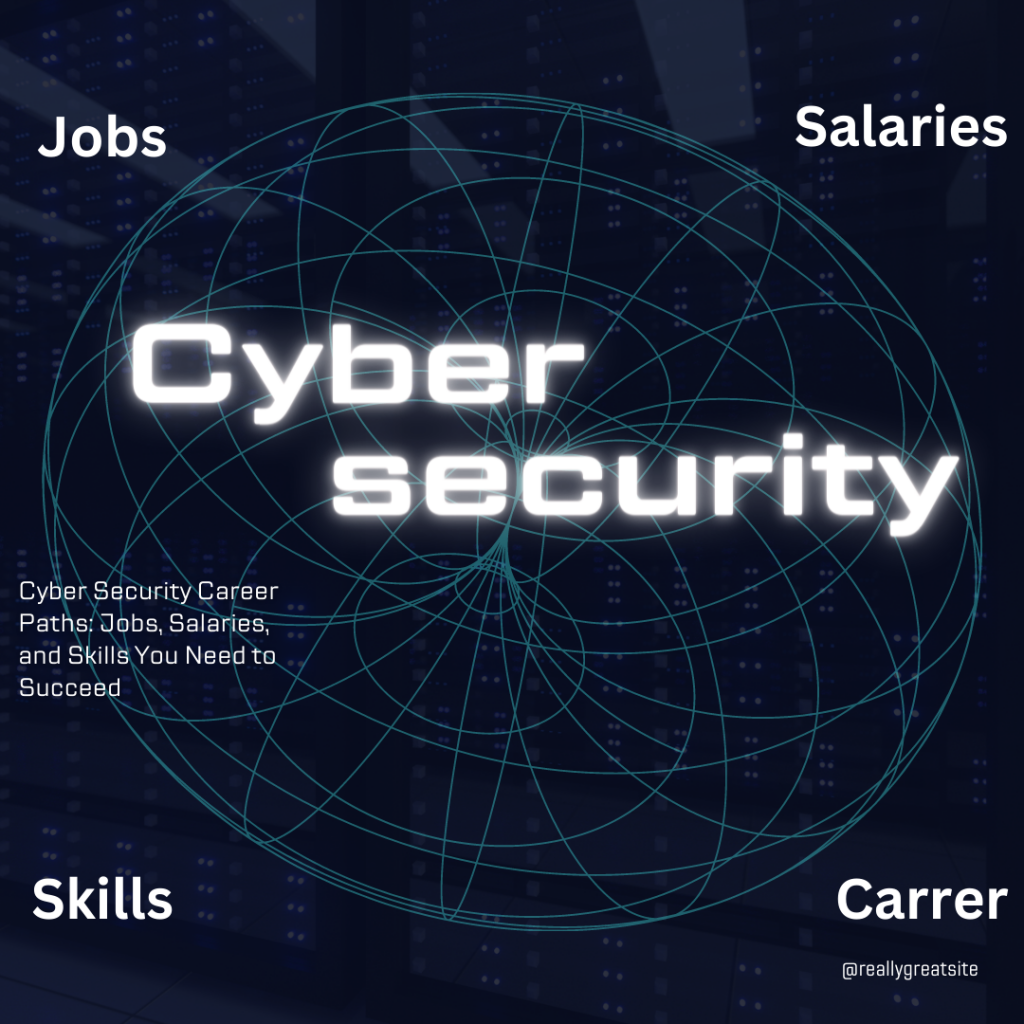As a result, the demand for cybersecurity careers has skyrocketed, making it an attractive field for those interested in technology and security. However, there are various cybersecurity career paths to choose from, each with its unique requirements, salaries, and opportunities for growth. This article will provide an overview of the top cybersecurity career paths, the skills needed to succeed in each role, and the expected salaries in the industry.
Overview of Cyber Security Careers
Cybersecurity is a rapidly growing field that involves protecting computer systems, networks, and data from unauthorized access, theft, and damage. As the use of technology continues to increase, so does the need for cybersecurity professionals. This has led to a surge in demand for cybersecurity careers, and as a result, a variety of job opportunities exist within the field.
Below is an overview of some of the most popular cybersecurity careers:
Information Security Analyst:
These professionals are responsible for protecting computer networks and systems from cyber threats such as malware, phishing attacks, and hacking attempts. They conduct risk assessments, develop security procedures, and monitor computer systems for potential threats.
Network Security Engineer:
Network security engineers are responsible for the design and implementation of network security measures to protect an organization's data and systems. They work to secure network infrastructure, identify vulnerabilities, and develop security policies and procedures.
Cybersecurity Consultant:
Cybersecurity consultants work with organizations to identify potential security risks and provide solutions to mitigate these risks. They also assist in developing security policies and procedures and conducting security audits.
Ethical Hacker:
Ethical hackers are hired by organizations to identify vulnerabilities in their systems and networks. They use the same techniques as malicious hackers to identify weaknesses, but with the goal of improving security rather than causing harm.
Cybersecurity Manager:
Cybersecurity managers oversee a team of cybersecurity professionals and are responsible for the overall security of an organization's systems and networks. They develop security strategies, manage budgets, and ensure compliance with industry standards and regulations.
Forensic Computer Analyst:
Forensic computer analysts specialize in investigating computer-related crimes. They analyze digital evidence, track cybercriminals, and provide evidence in legal proceedings.
Cryptographer:
Cryptographers are responsible for developing and implementing encryption algorithms to protect data and communications. They work to ensure that information is transmitted securely and cannot be intercepted by unauthorized parties.
In conclusion, cybersecurity careers are in high demand and offer a wide range of opportunities for professionals with various skill sets and backgrounds. As technology continues to advance, the need for cybersecurity professionals will only continue to grow.
Salary Expectations
Salary expectations in the cybersecurity field vary widely depending on the job role, level of experience, and location. Here are some of the average salaries for common cybersecurity jobs:
Information Security Analyst: The average salary for an Information Security Analyst in the US is around $98,000 per year.
Security Consultant: The average salary for a Security Consultant is around $106,000 per year.
Penetration Tester: The average salary for a Penetration Tester is around $96,000 per year.
Cybersecurity Manager: The average salary for a Cybersecurity Manager is around $120,000 per year.
Incident Responder: The average salary for an Incident Responder is around $94,000 per year.
Cryptographer: The average salary for a Cryptographer is around $117,000 per year.
Cybersecurity Engineer: The average salary for a Cybersecurity Engineer is around $113,000 per year.
It's important to note that these are just averages, and salaries can vary widely depending on a range of factors. In addition, salaries can also vary based on the industry or sector in which the cybersecurity professional works. For example, those working in the finance or healthcare industries may earn higher salaries than those working in other sectors.
Overall, the cybersecurity field offers competitive salaries and strong job growth potential, making it an attractive career path for those interested in technology and security.
Skills Needed to Succeed in CyberSecurity
The cybersecurity industry is highly dynamic and fast-paced, with constantly evolving threats and security challenges. To succeed in the field, cybersecurity professionals need a combination of technical and soft skills. Here are some of the essential skills needed to succeed in cybersecurity:
Technical Skills:
Cybersecurity professionals must have a solid understanding of network security, cryptography, and other technical concepts. They should be proficient in programming languages such as Python, Java, and C++, as well as have knowledge of operating systems like Windows, Linux, and Unix.
Analytical Skills:
Cybersecurity professionals must have strong analytical skills to identify security risks and develop effective solutions. They should be able to analyze data, interpret patterns, and identify anomalies that may indicate a security threat.
Communication Skills:
Communication skills are crucial for cybersecurity professionals as they need to explain complex technical issues to non-technical stakeholders. They should be able to convey technical information in a clear and concise manner and communicate the impact of security risks to senior management.
Problem-Solving Skills:
Cybersecurity professionals should have excellent problem-solving skills to quickly identify and resolve security issues. They should be able to think creatively and develop innovative solutions to complex security problems.
Attention to Detail:
Cybersecurity professionals must have a keen eye for detail to identify vulnerabilities and potential security risks. They should be meticulous in their work and able to identify even the smallest of security weaknesses.
Continuous Learning:
The cybersecurity industry is constantly evolving, and professionals need to stay up-to-date with the latest security trends, threats, and technologies. They should be passionate about continuous learning and willing to attend training programs and conferences to stay current in their field.
In conclusion, cybersecurity is a challenging and exciting field that requires a diverse range of technical and soft skills. Professionals who possess these skills and are committed to continuous learning will be well-positioned to succeed in the industry.
Education and Training Requirements
Education and training requirements for a career in cybersecurity can vary depending on the job role and level of experience. However, here are some of the common education and training requirements for cybersecurity professionals:
Bachelor's Degree: Many cybersecurity jobs require a bachelor's degree in a related field such as computer science, information technology, or cybersecurity. Some employers may accept degrees in other fields as long as the candidate has relevant work experience.
Certifications: Certifications such as CompTIA Security+, Certified Information Systems Security Professional (CISSP), and Certified Ethical Hacker (CEH) are highly valued in the cybersecurity industry. These certifications demonstrate that the professional has the knowledge and skills to perform specific cybersecurity tasks.
Professional Experience: Employers may require cybersecurity professionals to have several years of professional experience in a related field. This experience can be gained through internships, part-time work, or full-time employment.
Continuous Learning: As the cybersecurity industry is constantly evolving, professionals need to stay up-to-date with the latest security trends, threats, and technologies. They can do this by attending training programs, conferences, and other industry events.
Technical Skills: Cybersecurity professionals should have a solid understanding of network security, cryptography, and other technical concepts. They should be proficient in programming languages such as Python, Java, and C++, as well as have knowledge of operating systems like Windows, Linux, and Unix.
In conclusion, a career in cybersecurity requires a combination of education, certification, professional experience, and continuous learning. Cybersecurity professionals must possess a broad range of technical and soft skills to succeed in the field. Employers may also require candidates to have specific certifications or degrees depending on the job role.
What to Expect in the Job Market
The job market for cybersecurity professionals is currently in high demand and is expected to continue growing. With the increasing frequency and sophistication of cyber attacks, organizations are investing more resources into securing their networks and data, which is driving the demand for cybersecurity professionals.
According to the US Bureau of Labor Statistics, employment of information security analysts, a common job in the cybersecurity field, is projected to grow 33% from 2020 to 2030, which is much faster than the average for all occupations. This growth is attributed to the need for organizations to protect their information and assets from cyber threats.
In addition to strong job growth, the cybersecurity field also offers competitive salaries. The average salary for a cybersecurity professional in the United States is around $100,000 per year, with salaries ranging from $60,000 to over $150,000 depending on the job role, location, and level of experience.
However, it's important to note that the job market for cybersecurity professionals can also be highly competitive, with many candidates possessing similar technical skills and certifications. To stand out in the job market, cybersecurity professionals should focus on developing a diverse range of technical and soft skills, as well as gaining practical experience through internships or other work opportunities.
Overall, the cybersecurity job market offers a promising career path with strong job growth and competitive salaries. However, candidates should be prepared to continuously learn and adapt to the changing security landscape to remain competitive in the field.
Advice for Pursuing a Cyber Security Career
If you're interested in pursuing a career in cybersecurity, here are some pieces of advice to help you succeed:
Gain Relevant Experience:
One of the most important factors for landing a job in cybersecurity is having relevant work experience. Consider taking on internships, part-time work, or volunteer opportunities that allow you to gain hands-on experience in the field.
Build a Strong Foundation:
Pursue a bachelor's degree in a relevant field such as computer science, information technology, or cybersecurity. A degree will provide you with a solid foundation of knowledge and skills necessary to succeed in the field.
Obtain Certifications:
Certifications such as CompTIA Security+, Certified Information Systems Security Professional (CISSP), and Certified Ethical Hacker (CEH) demonstrate your expertise and can help you stand out in the job market.
Develop Soft Skills:
Cybersecurity professionals must have excellent communication, analytical, problem-solving, and attention-to-detail skills. Make sure to develop these soft skills through training and practice.
Stay Up-to-Date:
The cybersecurity field is constantly evolving, and it's crucial to stay up-to-date with the latest trends, threats, and technologies. Attend training programs, conferences, and other industry events to stay current in your field.
Network:
Build relationships with other cybersecurity professionals, attend networking events, and engage with online communities to build your network and stay informed about job opportunities.
Be Ethical:
Cybersecurity professionals must adhere to ethical standards and protect sensitive information. Make sure to prioritize ethical behavior and integrity in your work.
In conclusion, pursuing a career in cybersecurity requires a combination of technical knowledge, practical experience, and soft skills. By gaining relevant experience, obtaining certifications, developing soft skills, staying up-to-date, networking, and prioritizing ethical behavior, you can succeed in this dynamic and exciting field.








